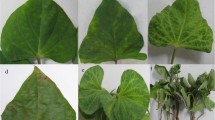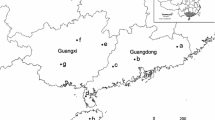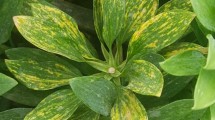Abstract
Sweet potato [Ipomoea batatas (L.) Lam] is increasingly becoming an important food and industrial crop worldwide that is affected by over thirty viruses belonging to different virus families. Little is known about these viruses on the many local and commercial sweet potato cultivars in the Caribbean, including Barbados. Therefore, polymerase chain reaction (PCR) and small RNA sequencing and assembly (sRSA) were used to detect viruses in the sweet potato leaf virome in Barbados. The viruses detected by sRSA were mainly from two virus families in sweet potato: Geminiviridae (genus Begomovirus) and Caulimoviridae (genus Badnavirus). Together, these viruses accounted for more than 75% of the virus contigs found in the sweet potato leaf virome in Barbados. Although sweet potato feathery mottle virus (SPFMV, genus Potyvirus, family Potyviridae) was frequently detected by PCR in infected leaf samples, only 10% of the sequenced contigs matched to these viruses in the leaf virome. The results suggest the absence of the sweet potato virus disease complex (SPVD) in Barbados but reveal possibly new, severe single virus infections or emerging virus associations in the virome largely composed of begomoviruses, badnaviruses, potyviruses and mastreviruses previously unreported in sweet potato in the Caribbean.




Similar content being viewed by others
References
Albuquerque LC, Inoue-Nagata AK, Pinheiro B, Resende RO, Moriones E, Navas-Castillo J (2012) Genetic diversity and recombination analysis of sweepoviruses from Brazil. Virol J 9:241
Altschul SF, Gish W, Miller W, Myers EW, Lipman DJ (1990) Basic local alignment search tool. J Mol Biol 215:403–410
Ateka EM, Barg E, Njeru RW, Lesemann D-E, Vettten HJ (2004) Further characterization of ‘sweet potato virus 2’: a distinct species of the genus Potyvirus. Arch Virol 149:225–239
Chen YR, Zheng Y, Liu B, Zhong S, Giovannoni J, Fei Z (2012) A cost-effective method for Illumina small RNA-Seq library preparation using T4 RNA ligase 1 adenylated adapters. Plant Methods 8:41
Clark CA, Davis JA, Abad JA, Cuellar WJ, Fuentes S, Kreuze JF et al (2012) Sweetpotato viruses: 15 years of progress on understanding and managing complex diseases. Plant Dis 96(2):168–185. https://doi.org/10.1094/PDIS-07-11-0550
Colinet D, Kummert J, Lepoivre P (1997) Evidence for the assignment of two strains of SPLV to the genus Potyvirus based on coat protein and 3′ non-coding region sequence data. Virus Res 49:91–100
Cuellar WJ, Galvez M, Fuentes S, Tugume J, Kreuze J (2015) Synergistic interactions of begomoviruses with sweet potato chlorotic stunt virus (genus Crinivirus) in sweet potato (Ipomoea batatas L.). Mol Plant Pathol 16:459–471
Gibson RW, Kreuze JF (2015) Degeneration in sweet potato due to viruses, virus cleaned planting material and reversion: a review. Plant Pathol 64:1–15. https://doi.org/10.1111/ppa.12273.
Gibson RW, Mpembe I, Alicai T, Carey EE, Mwanga ROM, Seal SE et al (1998) Symptoms, aetiology and serological analysis of sweet potato virus disease in Uganda. Plant Pathol 47:95–102. https://doi.org/10.1046/j.1365-3059.1998.00196.x
Gutiérrez DL, Fuentes S, Salazar LF (2003) Sweet potato virus disease (SPVD): distribution, incidence, and effect on sweet potato yield in Peru. Plant Dis 87:297–302
Hassan I, Orillo A, Fiallo-Olive E, Briddon RW, Navas-Castillo J (2016) Infectivity, effects on helper viruses and whitefly transmission of the deltasatellites associated with sweepoviruses (genus Begomovirus, family Geminiviridae). Sci Rep 6:30204. https://doi.org/10.1038/srep30204
James MS, Phillip MT, Fuentes S, Salazar LF (2003) A study on the cause of sweet potato virus disease in Barbados. Bridgetown. In: Proceedings of the Barbados National Agricultural Conference 2003: agricultural research and development: meeting the challenges of the 21st century. 10pp
Karyeija RF, Kreuze JF, Gibson RW, Valkonen JPT (2000) Synergistic interactions of a Potyvirus and a phloem-limited crinivirus in sweet potato plants. Virology 269:26–36
Kashif M, Pietilä S, Artola K, Jones RAC, Tugume AK, Mäkinen V et al (2012) Detection of viruses in sweet potato from Honduras and Guatemala augmented by deep sequencing of small RNAs. Plant Dis 96(10):1430–1437. https://doi.org/10.1094/PDIS-03-12-0268-RE
Kearse M, Moir R, Wilson A, Stones-Havas S, Cheung M, Sturrock S et al (2012) Geneious basic: an integrated and extendable desktop software platform for the organization and analysis of sequence data. Bioinformatics 28:1647–1649
Kokkinos CD, Clark CA (2006) Interactions among Sweet potato chlorotic stunt virus and different Potyviruses and Potyvirus strains infecting sweet potato in the United States. Plant Dis 90(10):1347–1352. https://doi.org/10.1094/PD-90-1347
Kreuze JF, Perez A, Untiveros M, Quispe D, Fuentes S, Barker I et al (2009) Complete viral genome sequence and discovery of novel viruses by deep sequencing of small RNAs: a generic method for diagnosis, discovery and sequencing of viruses. Virology 388:1–7
Li R, Salih S, Hurtt S (2004) Detection of Geminiviruses in sweet potato by polymerase chain reaction. Plant Dis 88(12):1347–1351
Li R, Gao S, Hernandez AG, Wechter WP, Fei Z, Ling K-S (2012) Deep sequencing of small RNAs in tomato for virus and viroid identification and strain differentiation. PLoS One 7(5):e37127
Lotrakul P, Valverde RA, Clark CA, Sim J, De La Torre R (1998) Detection of a Geminivirus infecting sweet potato in the United States. Plant Dis 82:1253–1257
Lozano G, Trenado HP, Valverde RA, Navas-Castillo J (2009) Novel begomovirus species of recombinant nature in sweet potato (Ipomoea batatas) and Ipomoea indica: taxonomic and phylogenetic implications. J Gen Virol 90:2550–2562
Mbanzibwa DR, Tairo F, Gwandu C, Kullaya A, Valkonen JPT (2011) First report of sweet potato symptomless virus 1 and sweet potato virus a in sweet potatoes in Tanzania. Plant Dis 95:224–225
Rännäli M, Czekaj V, Jones RAC, Fletcher JD, Davis RI, Mu L et al (2008) Molecular genetic characterization of sweet potato virus G (SPVG) isolates from areas of the Pacific Ocean and southern Africa. Plant Dis 92(9):1313–1320. https://doi.org/10.1094/PDIS-92-9-1313
Tairo F, Mukasa SB, Jones RAC, Kullaya A, Rubaihayo PR, Valkonen JPT (2005) Unravelling the genetic diversity of the three main viruses involved in sweet potato virus disease (SPVD), and its practical implications. Mol Plant Pathol 6:199–211
Trenado HP, Oríllo AF, Márquez-Martín B, Moriones E, Navas-Castillo J (2011) Sweepoviruses cause disease in sweet potato and related Ipomoea spp.: fulfilling Koch’s postulates for a divergent group in the genus Begomovirus. PLoS One 6(11):e27329
Tugume AK, Cuéllar WJ, Mukasa SB, Valkonen JPT (2010) Molecular genetic analysis of virus isolates from wild and cultivated plants demonstrates that East Africa is a hotspot for the evolution and diversification of Sweet potato feathery mottle virus. Mol Ecol 19:3139–3156
Tugume AK, Mukasa SB, Valkonen JPT (2016) Mixed infections of four viruses, the incidence and phylogenetic relationships of sweet potato chlorotic fleck virus (Betaflexiviridae) isolates in wild species and Sweetpotatoes in Uganda and evidence of distinct isolates in East Africa. PLoS One 11(12):e0167769. https://doi.org/10.1371/journal.pone.0167769
Untiveros M, Fuentes S, Salazar LF (2007) Synergistic interaction of sweet potato chlorotic stunt virus (Crinivirus) with Carla-, Cucumo-, Ipomo-, and Potyviruses infecting sweet potato. Plant Dis 91:669–676
Untiveros M, Fuentes S, Kreuze J (2008) Molecular variability of sweet potato feathery mottle virus and other potyviruses infecting sweet potato in Peru. Arch Virol 153:473–483
Wasswa P, Otto B, Maruthi MN, Mukasa SB, Monger W, Gibson RW (2011) First identification of a sweet potato begomovirus (sweepovirus) in Uganda: characterization, detection and distribution. Plant Pathol 60(6):1030–1039. https://doi.org/10.1111/j.1365-3059.2011.02464.x.
Winter S, Körbler M, Köllner U (1997) Detection and differentiation of sweet potato closteroviruses by RT-PCR and single-strand conformation polymorphism. In: Dehne HW, Adam G, Diekmann M, Frahm J, Mauler-Machnik, van Halteren P (eds) Diagnosis and Identification of Plant Pathogens. Developments in Plant Pathology, vol 11. Springer, Dordrecht. https://doi.org/10.1007/978-94-009-0043-1_104
Zheng Y, Gao S, Padmanabhan C, Li R, Galvez M, Gutierrez D et al (2017) VirusDetect: an automated pipeline for efficient virus discovery using deep sequencing of small RNAs. Virology 500:130–138. https://doi.org/10.1016/j.virol.2016.10.017
Acknowledgements
This work was funded with support from The University of the West Indies and The Ministry of Agriculture, Food and Fisheries (MAFF), Plant Pathology Unit, Barbados. We also acknowledge the support provided by Carol Thomas of the Inter-American Institute for Cooperation on Agriculture (IICA), Barbados. We also thank those farmers who provided access to their fields for sample collection in Barbados. We thank Jan Kreuze for a critical review and suggestions to improve the manuscript.
Author information
Authors and Affiliations
Corresponding author
Ethics declarations
Conflict of interest
The authors declare no conflict of interest.
Additional information
Publisher’s Note
Springer Nature remains neutral with regard to jurisdictional claims in published maps and institutional affiliations.
Rights and permissions
About this article
Cite this article
Alleyne, A.T., Cummins, C., Rowe, K. et al. Sequencing and assembly of small RNAs reveal the presence of several begomoviruses, potyviruses, badnaviruses and mastreviruses in the sweet potato leaf virome in Barbados. J Plant Pathol 101, 339–347 (2019). https://doi.org/10.1007/s42161-018-00214-1
Received:
Accepted:
Published:
Issue Date:
DOI: https://doi.org/10.1007/s42161-018-00214-1




